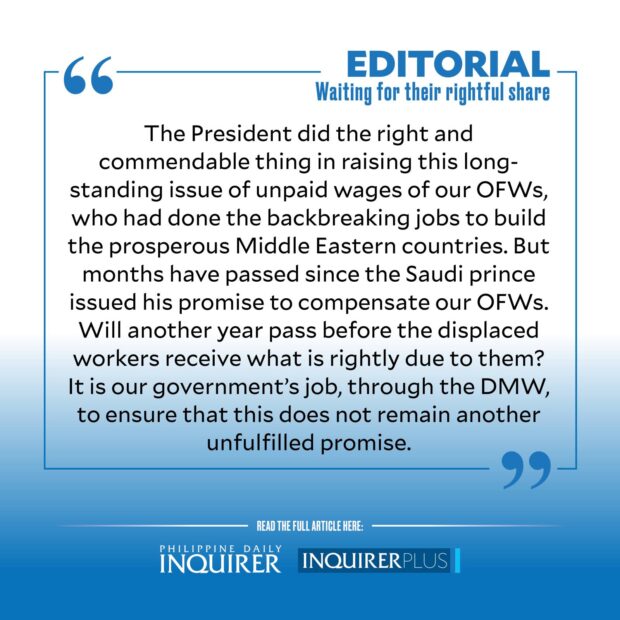Leaving their families and loved ones, overseas Filipino workers or OFWs, nevertheless feel their burdens lifted with outsized hopes and soaring dreams. Working in foreign lands for foreign employers, after all, is seen by many Filipinos as the key to a better life, a way out of poverty and joblessness that has become the curse of a large segment of the able-bodied population.
But for thousands of OFWs forced out by economic hardship in Saudi Arabia—as well as for many more thousands facing abuse, discrimination, exploitation, and even death elsewhere in the world—even the dream of employment abroad has soured and turned rancid.Take the case of the estimated 10,000 OFWs who were dismissed by their Saudi employers between 2015 and 2016 after their companies were closed down due to a financial crisis that hit Saudi Arabia. Forced to come home and losing their rights to compensation for years of hard work, the workers and their families have had to scramble for money to support themselves and keep their children in school.Even worse news is that during the long wait for their just compensation, a number of workers—from a low estimate of 40 by the Department of Migrant Workers (DMW) to a high of 88 by an OFW advocacy group—have passed away. Though officials say their survivors are entitled to compensation, the sting of disappointment and frustration must have lent a bittersweet edge to their passing.
But DMW Secretary Susan “Toots” Ople offers a sliver of hope for those workers who’ve been waiting for seven years or so for what’s rightfully theirs.
“I can say with full confidence that we can resolve the issue of unpaid claims of around 10,000 OFWs … within the year,” she assured. While the news might give the waiting workers some hope, they cannot be blamed for still harboring doubts and anxieties. After all, their hopes had been raised several times by government officials who said they had been reassured by Saudi authorities that they would get their claims, only to have these hopes dashed.
Our labor officials had engaged in talks with their Saudi counterparts who assured them that money for the OFWs was forthcoming. But, said Ople, it took a meeting between President Marcos and Saudi Arabia’s Crown Prince and Prime Minister Mohammed bin Salman on the sidelines of the Asia Pacific Economic Cooperation Summit in Thailand last November to pave the way for the processing of the claims.“This was when things changed,” Ople said. Because of the promise made by the Crown Prince, the negotiations for the OFWs’ compensation continued apace. Despite the passing of the years and the high-level dialog between the President and the Prince, though, Filipino claimants still have to jump through hoops before they see any money coming their way.
For one, the claimants will have to fill out email forms and send them to the DMW before a full list of claimants can be submitted to the Saudi government. Ople said she hopes to submit the final list by the end of Ramadan, in time for a meeting with her counterparts in Saudi Arabia on May 24, during which she expects to iron out the details of the payments for the unclaimed wages. The DMW should expedite this process since the agencies that were absorbed into the new department must have the records of the affected OFWs who could then be sought out to confirm their previous employment and claims. Just waiting for the OFWs to come to the DMW would further drag the process of collecting those unpaid salaries from the Saudi government.Meantime, the Philippine government has promised to give P10,000 to each claimant as financial aid pending the resolution of the issue. The P100 million is another big expense our government had to shell out because of the unpaid wages from the Saudi employers.
In his talk with Mr. Marcos, the Saudi prince pledged P30.5 billion in payment for the claims of the displaced OFWs. But many OFW leaders remain skeptical, noting that in 2021 former labor secretary Silvestre Bello III said his Saudi counterpart had offered to pay P4.6 billion for the claims of 11,000 OFWs by December that year. This, said Bello, was in exchange for the lifting of the suspension imposed on Arab recruitment agencies that were responsible for the deployment of the affected OFWs. Despite the inaction of the Saudis, though, the suspension was lifted during the Marcos administration. This stuck in the craw of OFW leaders, with one asking why our government lifted the ban when it was the only leverage enjoyed by the Philippines in its talks with Saudi officials.
The President did the right and commendable thing in raising this long-standing issue of unpaid wages of our OFWs, who had done the backbreaking jobs to build the prosperous Middle Eastern countries. But months have passed since the Saudi prince issued his promise to compensate our OFWs. Will another year pass before the displaced workers receive what is rightly due to them? It is our government’s job, through the DMW, to ensure that this does not remain another unfulfilled promise.
